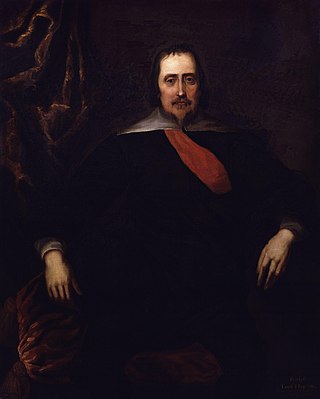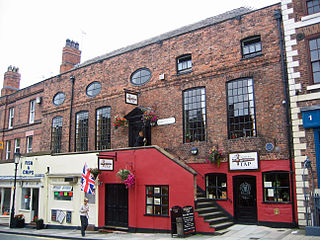Related Research Articles

Sir Arthur Haselrig, 2nd Baronet was a leader of the Parliamentary opposition to Charles I and one of the Five Members whose attempted arrest sparked the 1642–1646 First English Civil War. He held various military and political posts during the 1639–1651 Wars of the Three Kingdoms but became an opponent of Oliver Cromwell during the Protectorate. In 1660, his actions inadvertently helped restore Charles II to the throne; unlike many senior Parliamentary leaders, his life was spared but he was confined to the Tower of London, where he died on 7 January 1661.

Ralph Hopton, 1st Baron Hopton was an English politician, military officer and peer. During the First English Civil War, he served as Royalist commander in the West Country, and was made Baron Hopton of Stratton in 1643.

The First English Civil War took place in England and Wales from 1642 to 1646. It is part of the 1639 to 1653 Wars of the Three Kingdoms, which also include the Bishops' Wars, the Irish Confederate Wars, the Second English Civil War, the Anglo-Scottish war (1650–1652) and the Cromwellian conquest of Ireland. Historians calculate some 15% to 20% of all adult males in England and Wales served in the military between 1639 and 1653, while around 4% of the total population died from war-related cause, versus 2.23% in World War I. These figures illustrate the impact of the conflict on society in general, and the bitterness it engendered.

Sir John Urry, also known as Hurry, was a Scottish professional soldier who at various times during the Wars of the Three Kingdoms fought for Scots Covenanters, Engagers and Royalists, as well as both English Parliamentarians and Royalists. Captured at Carbisdale in April 1650, he was executed in Edinburgh on 29 May 1650.

William Russell, 1st Duke of Bedford KG PC was an English nobleman and politician who sat in the House of Commons from 1640 until 1641 when he inherited his Peerage as 5th Earl of Bedford and removed to the House of Lords. He fought in the Parliamentarian army and later defected to the Royalists during the English Civil War.
Thomas Wentworth, 5th Baron Wentworth, KB, PC was an English landowner and soldier who supported the Royalists during the Wars of the Three Kingdoms. At the end of the First English Civil War in 1646, he accompanied the future Charles II of England into exile and fought with him at the Battle of Worcester in 1651.
Sir Richard Weston (1579–1658) was an English judge and politician who sat in the House of Commons variously between 1614 and 1642. He fought on the Royalist side for King Charles during the English Civil War.
Sir Robert Holborne was an English lawyer and politician, of Furnival's Inn and Lincoln's Inn. He acted, along with Oliver St. John, as co-counsel for John Hampden in the ship money case. He sat in the House of Commons between 1640 and 1642 and supported the Royalist cause in the English Civil War. He was attorney-general to the Prince of Wales, being knighted in 1643. He also published legal tracts.
Richard Norton of Southwick Park, was an English landowner and politician who sat in the House of Commons at various times between 1645 and 1691. He was a colonel in the parliamentary army in the English Civil War and for a time he commanded the Parliamentary forces besieging Basing House. He was Governor of Portsmouth for Parliament during the Civil War and for Charles II after the Restoration.

Richard Herbert, 2nd Baron Herbert of Chirbury was an Anglo-Welsh Member of Parliament, a Royalist who fought with the rank of colonel in the English Civil War, and a peer whose membership of the House of Lords was curtailed by its abolition in 1649.

Sir William Savile, 3rd Baronet of Thornhill was an English politician who sat in the House of Commons between 1640 and 1642. He fought on the Royalist side in the English Civil War and was killed in action.
Charles Price was a Welsh soldier and politician who sat in the House of Commons variously between 1621 and 1642. He fought on the Royalist side in the English Civil War and is believed to have been killed in a duel.

Sir John Mallorie was an English politician who sat in the House of Commons from 1640 to 1642. He fought on the Royalist side in the English Civil War.

William Mallory of Studley Royal, Yorkshire was an English politician who sat in the House of Commons variously between 1614 and 1642. He supported the Royalist side in the English Civil War. His father, John Mallory, was also an MP of Ripon.
Sir Bryan Palmes (1600–1654) was an English politician who sat in the House of Commons in 1626 and 1640. He fought on the Royalist side in the English Civil War.
William Carnaby (1595–1645) was an English politician who sat in the House of Commons in 1640. He fought on the Royalist side in the English Civil War.
Fitzwilliam Coningsby was an English politician who sat in the House of Commons in 1621 and in 1640. He supported the Royalist cause in the English Civil War.

Sir Sidney Montagu was an English politician who sat in the House of Commons at various times between 1593 and 1642. He supported the Royalist cause in the First English Civil War.

Sir Francis Gamull, 1st Baronet (1606–1654) was an English politician who sat in the House of Commons from 1640 to 1644. He supported the Royalist side in the English Civil War and was active in the defence of Chester.

Thomas Coventry, 2nd Baron Coventry was an English politician who sat in the House of Commons between 1625 and 1629 and was subsequently a member of the House of Lords. He supported the Royalist cause in the English Civil War.
References
- ↑ Cracrofts Peerage - Earl of Portland
- ↑ Willis, Browne (1750). Notitia Parliamentaria, Part II: A Series or Lists of the Representatives in the several Parliaments held from the Reformation 1541, to the Restoration 1660 ... London. pp. 229–239.
- ↑ George Nelson Godwin, The Civil War in Hampshire (1642-45) and the story of Basing House Chapter II - The Siege and surrender of Portsmouth